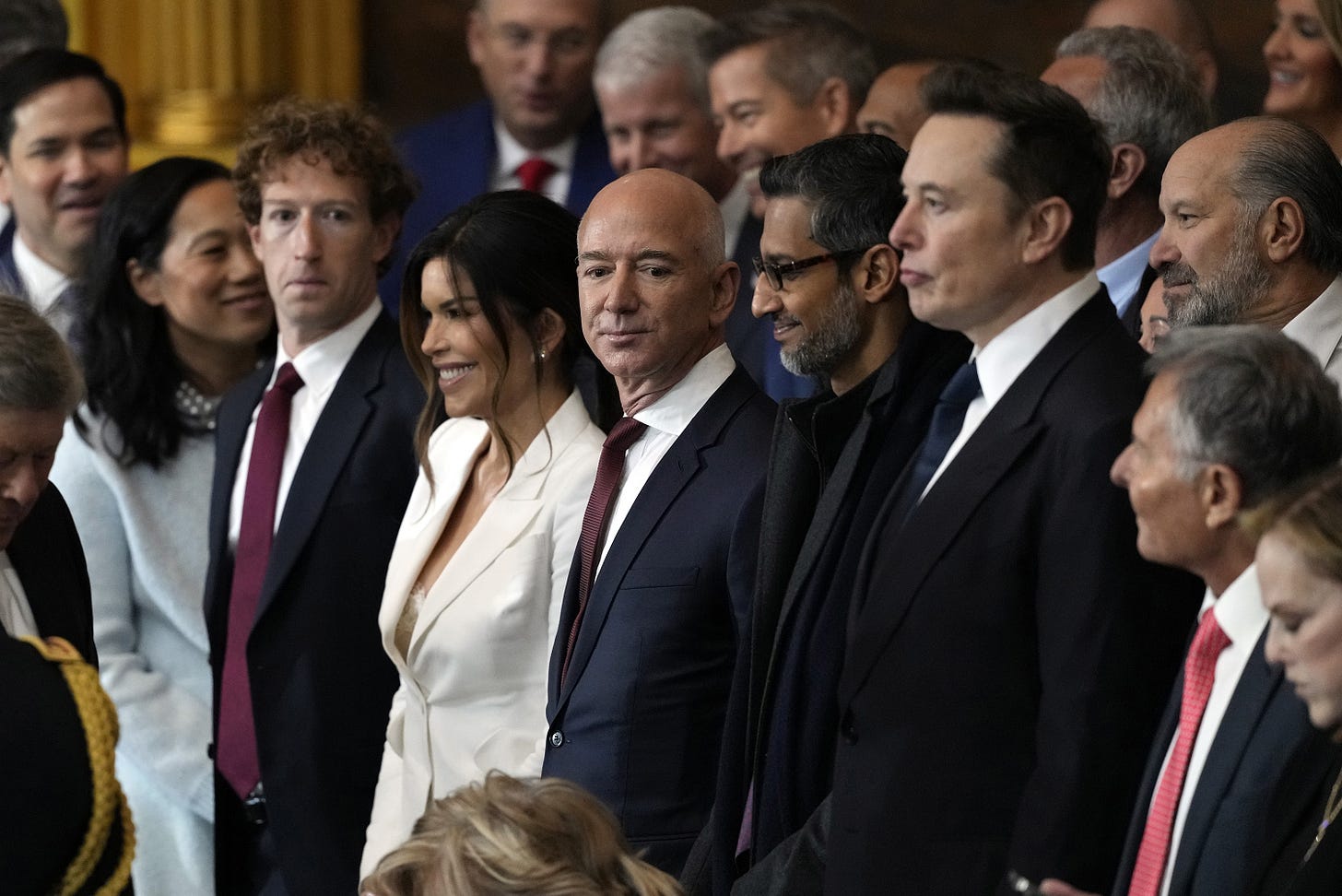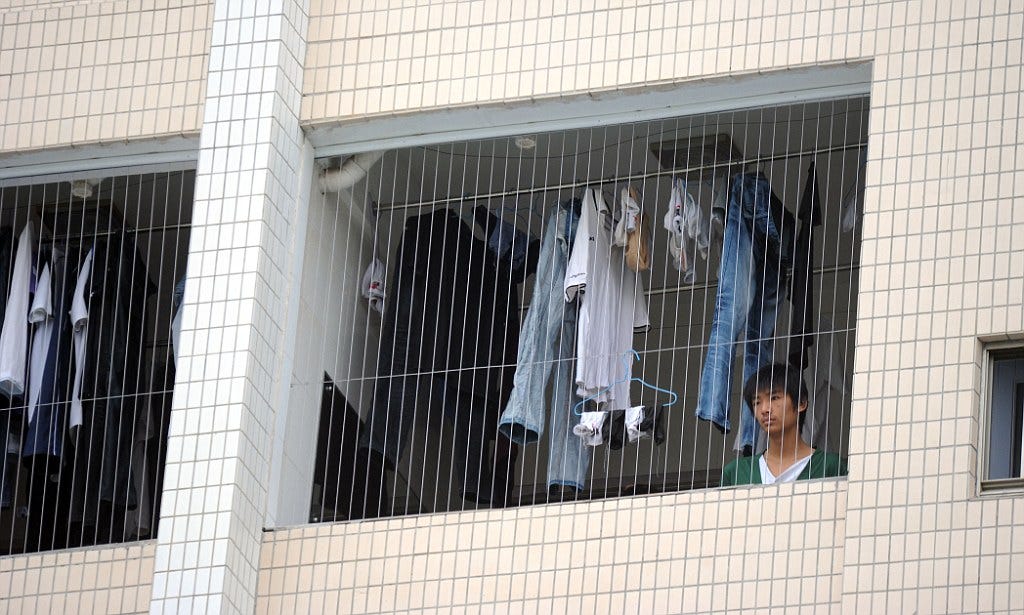As the second Trump term descends into authoritarian horror, let’s remember how it began: with Trump getting inaugurated while flanked not by representatives of the “white working class” but by the richest men on the planet—tech CEOs like Jeff Bezos and Elon Musk, Mark Zuckerberg and Google’s Sundar Pichai. The far-right had been railing incessantly against “woke” California tech firms. Just last November, current FCC chair Brendan Carr was lambasting Big Tech as a “censorship cartel” he intended to “dismantle.” But now, the mask is off. With solidification of Trump fascism, Big Tech isn’t just falling in line. Tech elites like Musk are directly taking the reins of state power. But tech CEOs have decimated working-class communities of color around the world and throughout their supply chains in their quest to amass the greatest concentration of wealth in recorded history. Is their cozying up to far-right nationalism really such a surprise?
The myth of woke tech
When it suited their brand image, California-based tech corporations fell over themselves to festoon their logos in rainbow colors for Pride month and issue earnest solidarity statements for Black Lives Matter. Audre Lorde, Gloria Anzaldúa, and Stonewall brick-thrower Marsha P. Johnson all got commemorated as Google Doodles. As of 2020, Netflix employees sent 98% of their political campaign donations to Democrats, with progressives like Bernie Sanders and Elizabeth Warren notably overrepresented. That year, X and Meta prevented users from sharing links to a New York Post story about the salacious contents of Hunter Biden’s laptop. Though for-profit tech firms have censored voices across the political spectrum, is it any wonder most people think of tech giants as being staffed by a bunch of West Coast liberals? And doesn’t this all mean that in order to combat Trump fascism, Big Tech should be encouraged to just return to its left-liberal roots?
I mean, at the height of the racial reckoning, Meta CEO Mark Zuckerberg declared:
To members of our Black community: I stand with you. Your lives matter. Black lives matter.
We have so far to go to overcome racial injustice in America and around the world, and we all have a responsibility and opportunity to change that.
But here’s the thing. Those “members of our Black community” at Facebook? They constituted a whopped 1.7% of Facebook technical workers. That’s not to say there hadn’t been progress. Six years earlier, just 1% of Facebook techies were Black. The company’s headquarters are right next to East Palo Alto, a working-class community of color that almost renamed Nairobi, California in the 60s. Its Black, Latinx, and Pacific Islander residents have been decimated by Facebook-sponsored gentrification.
Meta tried to cover up its objectively predatory relationship to East Palo Alto by sponsoring initiatives like The Primary School, a tuition-free private school bankrolled by the Chan Zuckerberg Initiative. Now that the political winds have shifted, the school’s told families that the 2025-2026 academic year will be its last.
In the words of Primary School parent Isabel Vargas:
“They were already taking our homes because of Facebook, landlords pricing us out. Now they’re gonna take this away too.”
Big Tech touted its liberal bona fides when that was advantageous. In a new political climate, it has no qualms about jumping ship to the right. This should be unsurprising, because beneath the transitory political commitments of CEOs, venture capitalists, and tech workers, there’s the question of what the tech industry actually does.
The current iteration of global capitalism has been called the Fourth Industrial Revolution by the World Economic Forum and the Knowledge Economy by the World Bank. In my book Defying Displacement, I argue we could just as easily call it the gentrification economy. The commanding heights of the capitalist economy are no longer the Ford Motors and Amalgamated Steels but the Metas, Amazons, and ByteDances of the world. Cities and national governments are falling over themselves to attract tech capital.
Per Jodi Dean in the LA Review of Books:
[A] handful of tech companies have become ever richer and more extractive, turning their owners into billionaires on the basis of the cheap labor of their workers, the free labor of their users, and the tax breaks bestowed on them by cities desperate to attract jobs. Apple, Facebook, Microsoft, Amazon, and Alphabet (the parent company name for Google) together are worth more than most every country in the world (except the United States, China, Germany, and Japan). The economic scale and impact of these tech super giants, or, overlords, is greater than that of most so-called sovereign states.
The new elite have little use for the remnants of the racialized urban working class, whose descendants now face mass expulsion as a manufactured housing crisis turns city after city into exclusive playgrounds for the rich. Manufacturing jobs have been automated, de-skilled, and outsourced, exported to places like China’s Shenzhen special economic zone. There, precarious migrant workers construct a full half of the world’s electronics. Before 24-year-old Foxconn worker Xu Lizhi killed himself in 2014, he wrote of his life working in electronics assembly:
The paper before my eyes fades yellow
With a steel pen I chisel on it uneven black
Full of working words
Workshop, assembly line, machine, work card, overtime, wages…
They’ve trained me to become docile
Don’t know how to shout or rebel
How to complain or denounce
Only how to silently suffer exhaustion
The lion’s share of value in contemporary technical supply chains isn’t captured by factory workers, of course, but by tech executives and their elite, “high-skilled” workers in hubs like San Francisco and Austin. It is a world predicated on the precarity of the many and ownership by the few, with a selective group of (mostly) white Americans extracting resources from workers and users the world over, from Congolese cobalt mines to Chinese sweatshops to East Palo Alto apartment buildings.
Artifical intelligence, “natural” order
Now, the advent of generative artificial intelligence systems threatens a mass de-skilling and devaluation of intermediate professional positions like writing, research, programming, and visual arts. The Organisation for Economic Co-Operation and Development warns that a full 27% of member nation jobs could be automated. The profits generated by a new wave of precaritization will once again be concentrated for executives and stockholders. Labor markets are expected to adapt to the new paradigm, just like low-wage service-industry jobs replaced manufacturing roles in the post-industrial US. However, keeping wages for “skilled” and “unskilled” labor alike from entering free-fall in the short-term requires, among other things, radical restrictions on the labor supply—such as Trump’s draconian anti-migrant policies.
I know the threat of fascism looms larger than AI in most of our minds. But the two are part of a larger whole.
More than just going along with Trump fascism, Big Tech finds it a perfect partner. That’s not to say that Trumpian nativism is the only political system that fits with the gentrification economy. Tech magnates have found the settler-colonial ethnonationalism of the “startup nation,” Israel and “socialism with Chinese characteristics” perfectly acceptable accomplices, as well. But Big Tech was never The Resistance, regardless of how its well-paid programmers voted, because Big Tech was never an opponent to the violence of racial capitalism. On the contrary, it was its worst contemporary instantiation.
It’s the only industry that could have birthed the likes of a Curtis Yarvin, the influential former computer engineer who dreams of a post-democratic America run like a privately-owned tech firm. Yarvin, who appeared at Trump’s Coronation Ball and has gotten shout-outs from Vice President JD Vance, Elon Musk, and Palantir’s Alexander Karp, espouses a radically anti-democratic, anti-Black political philosophy that fits Silicon Valley’s “meritocratic,” “move fast and break stuff,” CEO idolatry ethos like a glove. Big Tech framed itself as employing a “cognitive elite,” an enlightened caste that served humanity by displacing their darker, working-class neighbors.
Is the political elitism of right-wing authoritarianism really such a stretch?
This post has been syndicated from In Struggle, where it was published under this address.




